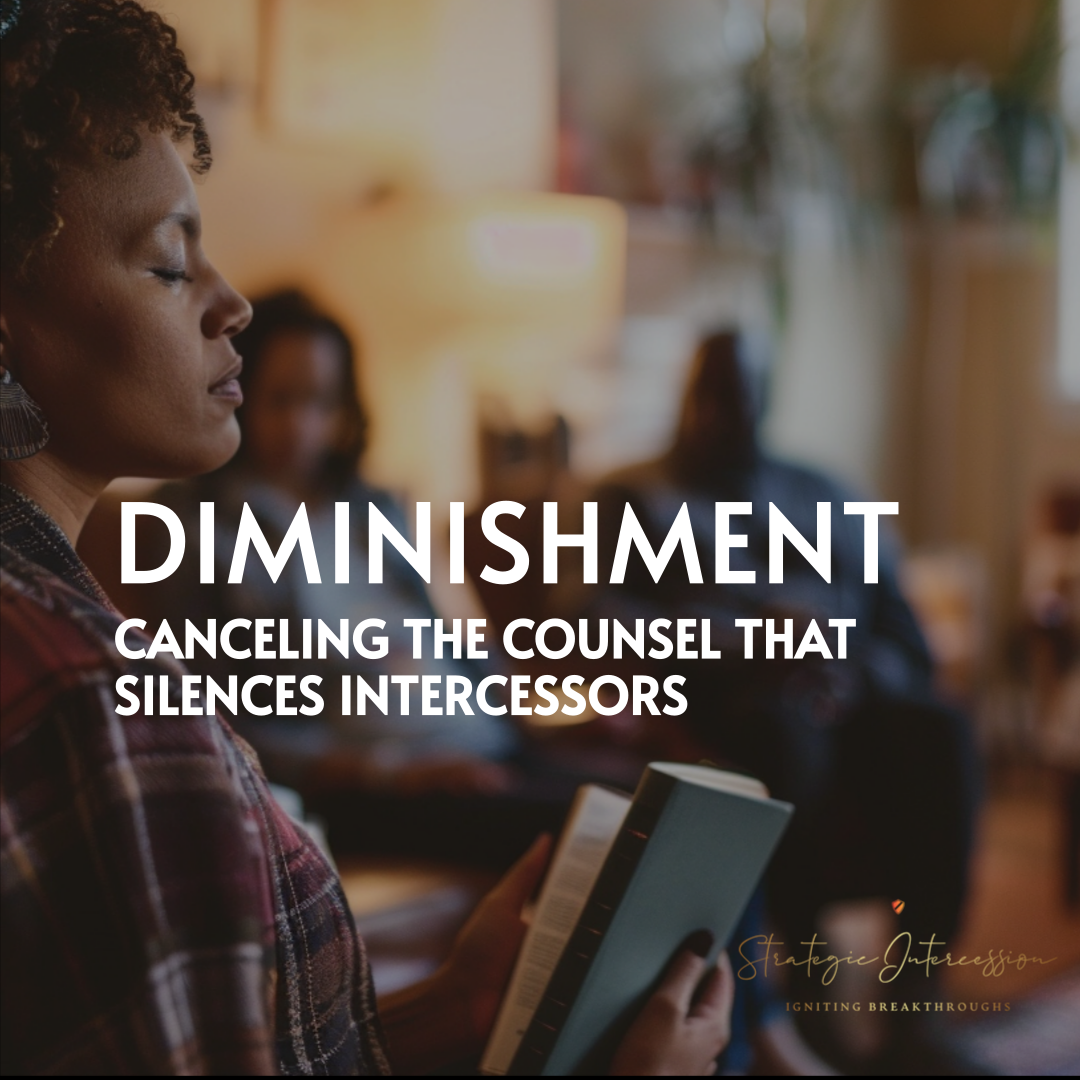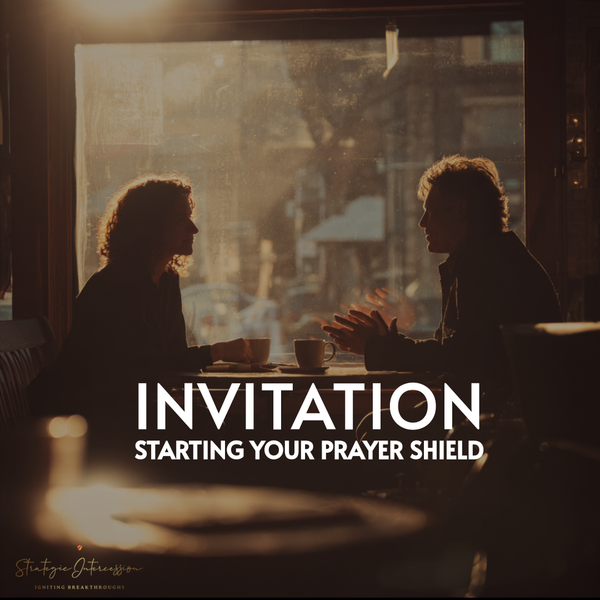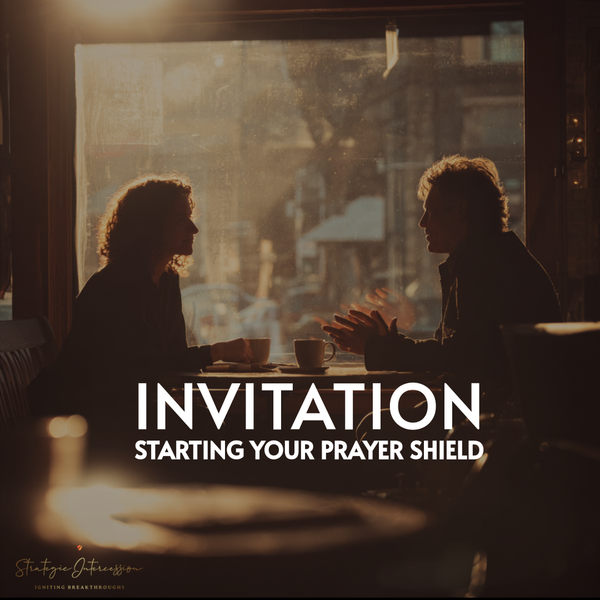Blog 18 - Diminishment: Canceling the Counsel That Silences Intercessors
When intercessors compare themselves and go quiet, a subtle counsel is at work. Your way of praying still matters — more than you think.

In this episode, I want to talk about a subtle tactic the enemy often uses: the spirit of diminishment—a scheme, really a demonic entity, designed to shrink the practice of intercession, weaken our sense of calling to pray, and cause us to question the value of our own prayers.
The enemy is a master of distraction. He loves to shift the spotlight away from Jesus and onto himself.
I'll never forget a moment at a leader's conference far from home—during a time of worship—a man collapsed, violently manifesting a demon. Instead of moving him to a private space for deliverance, the leaders allowed it to unfold in full view for the remainder of the worship time, hijacking the entire room. I could sense the enemy's delight, stealing attention in a moment meant to magnify Jesus.
Even seasoned leaders are still learning how to respond wisely in moments like these. We've all had times when we let a distraction run longer than it should. It's part of growing in discernment and learning how to swiftly re-center the room on Jesus.
Diminishment shows up the same way. It may not throw a fit in the aisle, but it knows how to pull focus—quietly convincing you your prayers don't carry weight, your voice doesn't belong, or someone else would say it better. But that voice doesn't belong at center stage. We're going to learn how to deal with it behind the scenes—and get our focus back where it belongs: on Jesus, who is worthy of all our attention and praise.
In group prayer settings, the spirit of diminishment doesn't silence through force—it works through comparison. You hear one strong, confident voice take the lead, and suddenly yours feels small. Different. Out of place. Not because anyone told you to be quiet, but because something inside starts asking, "I keep wondering… am I even made for this kind of prayer?" That's the counsel of diminishment.
And it’s not just something that shows up during group prayer. The spirit of diminishment may comes after leaders in a different way. They may feel the need for prayer covering over their work, yet something subtly talks them out of it: "Things are going well enough. Do I really need to bother anyone with this?"
It sounds like humility, but it's not—it's diminishment. It convinces them that only the most important people, urgent assignments, or emergencies are worth asking others to pray about. Over time, it reframes the need for prayer support as an excessive request, making a prayer shield feel like a luxury rather than the essential safeguard it truly is.
Have you been counseled by the spirit of diminishment, convincing you that a prayer shield can wait?
The Apostle Paul urges us not to be ignorant of the enemy's schemes (2 Corinthians 2:11). When we remain unaware, we become vulnerable. But when we're spiritually alert, we're reminded to put on the full armor of God (Ephesians 6:11) and stand firm against every strategy that would pull our eyes away from the King.
The Universal Call to Prayer
Recently, I've been reading Hearing God by Dallas Willard. Willard's intent for his readers is to foster a conversational relationship with God. Mere humans can talk with God—biblical accounts serve as active mentors, not distant historical figures. He counters the notion that only exceptional individuals can hear God, emphasizing that our humanity—our ordinary, flawed nature—does not preclude interaction with the divine. Hearing God, in a robust variety of ways, is a universal possibility for all believers, a joy not reserved for the elite!
"The prayer of a righteous person is powerful and effective."
The same is true for receiving profound answers to prayer. Oh my, go back and listen to episode 12 if you want to know how to pray for healing and see God move!
James 5:17 NIV says: "Elijah was a human being, even as we are. He prayed earnestly that it would not rain, and it did not rain on the land for three and a half years." Elijah, though used powerfully by God, was just as human as we are—reminding us that ordinary people can pray with extraordinary results. Indeed, the preceding verse reads, "The prayer of a righteous person is powerful and effective."
What holds us back from praying boldly and with authority, when God has given us this incredible gift—prayer that truly moves His hand on behalf of ourselves and others?
My Journey from Diminishment to Confidence
For me, the shift away from listening to the counsel of diminishment began years ago when I read Intercessors: Discover Your Prayer Power by Tommi Femrite, founder of Apostolic Intercessors Network (AIN) and Gatekeepers International. Tommi has since gone to Heaven, but I still work as an Intercessor and Team Director through AIN, serving clients all over the globe through the creation and maintenance of custom prayer shields. Tommi was one of my mentors, and through her book, I began to see the subtle ways the enemy had undermined my own confidence in prayer.
Some prayers seemed eloquent, passionate, or 'powerful,' and mine didn't always sound like that. It left me feeling spiritually 'less than'—like my prayers weren't as effective or anointed.
Prayer itself has always come easily to me—but prayer beyond the confines of my closet, especially in group settings, often felt awkward. I was too aware of the differences in how people pray. Some prayers seemed eloquent, passionate, or "powerful," and mine didn't always sound like that. It left me feeling spiritually "less than"—like my prayers weren't as effective or anointed. In all honesty, I confess this self-consciousness revisits me to this day, and I remind myself of the very truths I am sharing with you now.
Vulnerability to the spirit of diminishment affecting my prayer life waned when I began to understand the concept of different prayer anointings. Just like there are different spiritual gifts, there are different ways God moves through people in prayer. Once I grasped that, it became easier to stop comparing and start embracing the way God had wired me to pray.
The enemy loves to sow diminishing self-doubt—to convince us that our voice in prayer doesn't matter. But recognizing the diversity of prayer anointings not only builds our own confidence, it also helps us honor others and make space for every expression of prayer in group settings.
Understanding Your Prayer Identity
Every Christian is called to intercession, but each of you brings a distinctive prayer personality—whether you're a structured "list" intercessor, a prophetic prayer warrior, a mercy-driven intercessor, or another style. Rather than comparing yourself to others, you can discover your specific "prayer gift"—recognizing how God uniquely equips you to stand in the gap.
Then you can use your individual strengths as part of a unified, integrated prayer movement—joining with others whose gifts complement yours to cover families, churches, projects, communities, businesses, cities, governments, and even nations. You can embrace your own calling without envy or overwhelm—recognizing that your intercession contributes to a larger, Kingdom-focused vision.
In short: you don't have to pray like someone else to make an impact. God has entrusted you with a role tailored to your heart and gifting. Each one of us has a power mix that is not earned, but enables us to accomplish what God has assigned to us to do in prayer.
Each one of us has a power mix that is not earned, but enables us to accomplish what God has assigned to us to do in prayer.
Each of you carries a unique anointing. A way of praying—a posture, even—that God has placed in you for a reason. You might not have thought of it that way before. But just like spiritual gifts or personality wiring, there are different kinds of intercessors—different expressions of the same Spirit.
Like personality traits, these anointings have a flip side. There are strengths that build the Body and express God's heart... and there are pitfalls you need to recognize so you can grow in wisdom and unity.
Think of it this way: a person with an adventurous personality might be full of vision, energy, and risk-taking faith—but without structure, they might forget details or create chaos for others. Awareness allows you to set up healthy boundaries, accountability, or even simple tools—like setting reminders—so you don't sabotage the very gifts God gave you.
Without awareness and humility, you can cause unintentional friction, especially when partnering in prayer with others.
The same is true of your prayer anointings. Without awareness and humility, you can cause unintentional friction, especially when partnering in prayer with others. But when you understand your own wiring, and make space for other kinds of intercession, prayer becomes a powerful expression of unity—not uniformity.
Five of the 12 Prayer Anointings from Tommi Femrite's Framework
Tommi outlines twelve of these prayer anointings in her book and I've found them incredibly helpful. Not as a rigid list, but as a way of understanding, "Oh—that's what I've been doing," or "That's why I get discouraged in that area."
You might recognize yourself in one or two of these more than the others. That's okay. It's not a hierarchy—it's just different provisions for the intercessory assignments God has entrusted to us. It is not uncommon to operate in many of these anointings during different seasons of our lives. And knowing your own prayer identity can help you walk in it more fully, disempower the enemy's voice of diminishment—and give others more grace, too, as you come into agreement with them in prayer.
Let's walk through five of the twelve prayer anointings together.
1. List Intercessors
If you're a list intercessor, you're the organized pray-er. You've got notebooks, prayer apps, spreadsheets—I'm not kidding. You make sure nobody gets forgotten. When you say, "I'll be praying," you mean it.
It's beautiful, really—you bring consistency and coverage to the prayer movement. You're often the glue in a group.
But the downside is legalism, becoming unintentionally performant. If you don't finish the list, you can feel like you've failed. Or you miss what the Spirit's doing in the moment because you're determined to get through page two.
The list is a tool, not the goal. God isn't grading your completion rate.
2. Mercy Intercessors
You feel things. You cry for people you barely know. You pray with tenderness. You see pain others miss—and you carry it before God like a sacred offering. You weep during prayer—not because you're overly emotional, but because you carry God's heart for people's pain and need.
I think of my friend Brooke, who once attended a prayer meeting where the spirit of intercession hit her powerfully. She sobbed through the entire prayer time—not because she was dealing with personal trauma, but because the Holy Spirit was moving through her with deep compassion for the situation being prayed about. But instead of recognizing this as a beautiful expression of God's heart, the others who were praying made assumptions. Some thought she was having an emotional breakdown. Another assumed she was dealing with deep personal wounds or instability. The awkwardness was palpable, and she left feeling embarrassed and misunderstood.
What mercy intercessor wants to go to a public prayer meeting when they know their tears will be misinterpreted as personal problems rather than recognized as a genuine prayer anointing?
There is a clear unspoken message: your tears are inappropriate, and your emotional expressions make others uncomfortable. Compassion is weakness. Some may even ask if you need counseling, when what you really need is understanding that you're carrying God's heart.
Mercy Intercessors carry the very heart of God. Your tears are sacred—they represent God's compassion for hurting people and His desire to bring comfort and healing.
If you're moved to tears during prayer, don't apologize for it. Your emotional connection isn't weakness—it's a reflection of God's own heart for the hurting. You're in good company: when Jesus looked out over His people, He cried over Jerusalem's spiritual blindness and the judgment that would come upon it because of their rejection of Him. (Luke 19:41–42)
While drawn to the overlooked, the hurting, and the outcast, Mercy Intercessors must be careful not to get pulled into emotional rescue missions God didn't assign to you. There's a difference between being led by the Spirit and being driven by the soul.
Also—don't be afraid to speak the truth. Mercy and truth belong together. That's how healing happens.
3. Warfare Intercessors
Some of you were born for battle. You see through the chaos—past the surface of things—and you recognize when and how the enemy is scheming. You don't back down. You engage. You pray with spiritual authority, and you know what it means to take ground in the Spirit.
You fight to establish God's truth where darkness has tried to reign. And your prayers change things.
But let's talk about the cautions too.
When every prayer becomes a battle, it's easy to forget God's invitation into intimacy. You're not just a soldier. You're a son. A daughter. You need worship. Stillness. Beauty. You need rest—not just from war, but in God's presence.
And don't forget strategy. Every warrior needs a battle plan. It's dangerous to rush in without one. That includes making sure your own life is in order—no open doors, no unfinished spiritual business, no skipping the creation and maintenance of your own prayer shield to cover you as you battle for others.
Another common challenge? You might be so locked into fight mode that you leave no room for gentler giftings when praying with others. God didn't call you to dominate a prayer meeting—He called you to partner. Your authority shines best when it flows in humility and connection with the rest of the Body.
So yes—fight.
But fight from a place of peace.
Fight with His strategy.
And remember who's really leading the charge. He leads from a place of love that honors all who serve Him through prayer.
4. Personal Intercessors
Some of you have been given an assignment—not to a cause or a country, but to a specific person—a leader, a pastor, even a public figure. Not just to pray once or twice, but long-term. You're what we call a personal intercessor.
You carry that person in prayer like armor. You sense things before they happen. God has entrusted you to take them into the Throne Room and lay them at His feet. You intercede for their protection, provision, stamina, decisions—even their personal emotional and spiritual needs, as Holy Spirit discloses them to you.
You've wondered if anyone sees what you carry.
God does. We labor as unto God, and not as unto man.
The challenge here is boundaries. It's easy to crave closeness, recognition, or approval from the person you're praying for. Or even discreetly bragging about the person for whom you intercede. Or thinking so highly of them that you neglect to speak truth into their lives.
Stay hidden in Christ, be impeccable about confidentiality, and cover what needs covering.
5. Prophetic Intercessors
If you're a Prophetic Intercessor, you're wired to hear what others miss—to see what hasn't yet come into view. You don't just react in prayer; you respond to what God reveals in advance.
He shows you what's coming so you can pray it in—to faithfully intercede. You may feel the weight of something in your spirit long before it unfolds. That's not imagination. That's your call.
Your job is to take what God whispers and bring it before His Throne—for breakthrough.
But there are real pitfalls.
Because in many Christian circles, those who see and hear accurately are typically held in high esteem, you might start finding your identity in your gifting instead of who you are in Christ. Or you might feel pressure to adjust what God said—to make it sound less weird, or safer, which is actually a subtle form of people pleasing.
Stay humble. Stay submitted. Don't bypass spiritual authority or accountability. And always remember—your intercession isn't about being "in the know." It's about being on your knees.
You're here to carry God's heart in prayer until His purposes come to pass.
There are seven more prayer anointings; I created a resource for you that includes all of the prayer anointings covered by Tommi’s framework. We just discussed five of them; Don't miss the different expressions of prayer to find your own strengths.
Making Group Prayer Accessible
I've ministered in multiple nations and observed different ways believers come together to pray. Each model allows both opportunities and challenges for making space for diverse prayer anointings.
In many churches around the world, everyone prays aloud at the same time. This creates a powerful sound—like a spiritual volcano erupting with many voices crying out to God simultaneously. This model reduces comparison because you can't clearly hear what others are praying, allowing each person to express their heart freely.
The Western model typically has one person praying at a time while others listen silently. This can create beautiful moments of agreement, but it can also unintentionally favor those comfortable with public speaking or certain prayer styles, especially warfare intercessors who often dominate the microphone.
Some prayer meetings use a leader-directed approach where the facilitator announces a specific topic and either calls on one person to pray or invites everyone to pray about that topic simultaneously. This helps maintain focus while making space for different prayer expressions.
Does our model make prayer accessible for everyone?
The key question for any prayer gathering is this: Does our model make prayer accessible for everyone? Are we creating space for the list intercessor's methodical prayers, the mercy intercessor's tears, the warfare intercessor's declarations, and the prophetic intercessor’s strategic approach for breakthrough? When we make room for diverse prayer anointings, we reflect the beautiful variety in the Body of Christ.
Prayer Shields vs. Group Prayer Meetings
There's an important distinction I need to make between group prayer meetings and how prayer shields function. Many people assume that to have an effective prayer shield, everyone needs to meet together at the same time to pray. This assumption can become a major barrier to establishing the prayer coverage leaders desperately need. But that's just not necessary and raises the bar for participation and commitment beyond what most people are able to do.
Coordinating schedules for multiple people to gather regularly—whether in person or online—is incredibly challenging. The beautiful thing about a prayer shield is the freedom we have to not be in the same location or even on a call together. Prayer shield members are simply responding to the updates you provide as a leader, praying strategically on your behalf when Holy Spirit brings you to their remembrance.
This is a much easier prayer model than asking someone to give up a night of the week to coordinate with other intercessors, having to sit quietly while waiting for others to pray. It's more of a personal commitment to a leader, and the fulfillment of that commitment is between them and God. As a leader, you keep those intercessors engaged through your updates and through your relational interaction with them as you maintain your shield through connection.
This kind of prayer coverage is very different than meeting together in a room with everybody putting their hands on someone to pray for them. It's a much lighter, more easily obtainable goal of intercession.
In previous episodes, I've covered the idea that a prayer shield intercessor doesn't need to pray every day for the leader. Rather, they pray when Holy Spirit brings the leader to mind. This kind of prayer coverage is very different than meeting together in a room with everybody putting their hands on someone to pray for them. It's a much lighter, more easily obtainable goal of intercession—to have people pray spontaneously when Holy Spirit brings them to mind or, for a list intercessor, when they come up on their list—as opposed to meeting together at the same time.
Your prayer shield can be incredibly effective without ever gathering in one place. What matters is that each intercessor is committed to covering you in their unique way, using their specific prayer anointing to provide the spiritual coverage you need. Meeting together, whether online, on the phone, or in person, is a bonus– a nice to have– but absolutely not a requirement for a prayer shield that gets things done in the spiritual realm.
Building Your Prayer Shield: A Leader's Perspective
As a leader, understanding prayer anointings isn't just about personal growth—it's about strategic prayer coverage. When you're building a prayer shield, you want to consider which anointings would best serve your specific ministry context and challenges.
For example, if your ministry works with families in a neighborhood struggling with gang violence, you'll want a crisis intercessor on your team who can pray urgently when situations escalate. You might also need a people group intercessor who understands cultural dynamics and can pray with insight for the specific community you're serving. A soul intercessor—what some call a "midwife intercessor"—would be invaluable for praying people into salvation.
If you're in business leadership facing complex negotiations and financial decisions, a financial intercessor who has faith for provision and breakthrough would be strategic. Then you might want to add a warfare intercessor who can discern and combat spiritual opposition to Kingdom business ventures.
The point is this: understanding prayer anointings helps you build a prayer team that's not just willing but specifically equipped for your unique battles and assignments. It's like assembling a spiritual special forces team where each member brings critical capabilities to the mission.
It's like assembling a spiritual special forces team where each member brings critical capabilities to the mission.
This is actually one of the beauties of becoming a client of Apostolic Intercessors Network (AIN). When AIN interviews a client to understand their specific needs, the assigned Advisor and Team Director can then custom-select vetted intercessors with the right spiritual gift mix to provide comprehensive prayer coverage. It's a long-term, custom-crafted prayer team designed for maximum effectiveness.
Now, I realize many of you are thinking, "I'd be grateful to find anyone willing to pray for me, let alone someone with a specific anointing!" And that's valid. Having any prayer coverage is better than none. But being aware of these distinctions can help you recognize and appreciate the different ways people on your team are already praying, and it might help you identify gaps in your prayer coverage that need to be filled.
Remember, you don't need all twelve types of intercessors on your team. You need the ones that match your specific assignment and season. And as your ministry evolves, you might find you need to adjust your prayer shield accordingly.
Embracing Your Prayer Identity
Now let's pause for a moment and remember something vital:
You don't have to fit a certain mold to be a powerful intercessor.
God has wired you intentionally. Whether you pray from a place of mercy, or you prayerfully worship shifting atmospheres, or you're a governmental intercessor able to cut through political intrigue, or someone who simply prays through a list faithfully each morning—you're anointed for that.
Some of you pray spontaneously in the Spirit. Others journal quiet Spirit-led prayers with tears. Some get woken up at 3 a.m. with an urgent burden; others keep a steady rhythm at 6 a.m. with coffee and a Bible.
Each expression is holy.
Your written-down prayer, capturing scriptural truths to enforce – birthed through your communion with God–may carry just as much power as someone else's spontaneous fiery declaration.
Your consistent whisper borne of your heart proximity to Jesus can be just as Spirit-led as someone else's urgent cry.
Comparison that undermines our confidence in prayer is nothing more than counsel from the spirit of diminishment—a force devoted to silencing our powerful proclamations that God has pre-ordained to move mountains.
And if you intercede with great faith for finances to fund a work of God from a small apartment? That is no less effective than someone praying from a penthouse with big resources and vision.
Comparison that undermines our confidence in prayer is nothing more than counsel from the spirit of diminishment—a force devoted to silencing our powerful proclamations that God has pre-ordained to move mountains.
God isn't looking for performance—He's looking for partnership.
He anoints us differently on purpose, and the moment we embrace that, we stop striving and start flowing in the goodness of our own identity in prayer.
The enemy loves to make us feel “less than” if our intercession doesn't sound like warfare or doesn't include insider details showcasing knowledge. But that's just noise. Your prayers matter. Your anointing carries weight—because it came from Him.
And when we gather with others to pray, we don't have to sound like anyone else in the room.
We honor the variety.
We stay in our lane.
And we trust that God is weaving all of it—every style, every strength—into something beautiful and powerful for His Kingdom.
Step Into Your Prayer Assignment
Your prayers matter. Your voice counts. And the way God has wired you to pray is exactly what is needed for breakthrough.
I’ve created a more in-depth resource than what we’ve been able to cover in this episode. It’s called Discover Your Voice: 12 Prayer Anointings. This guide outlines all twelve prayer anointings that Tommi Femrite presents in her book and is designed to help you discern your specific calling and grow in it. You can download it for free at StrategicIntercession.com.
Remember: Your prayers matter. Your voice counts. And the way God has wired you to pray is exactly what is needed for breakthrough.




